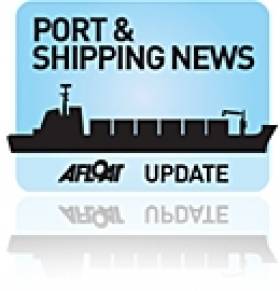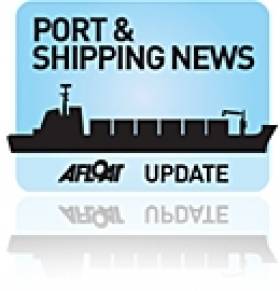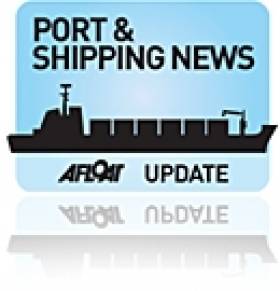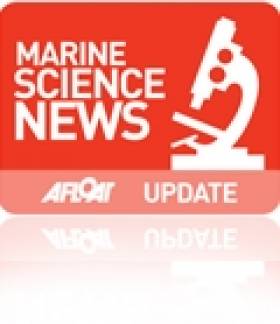Displaying items by tag: State of Maine
The Empire Strikes Back
The 14,620 dwt US-based training-ship Empire State made a return call to the Port of Cork last night for a four-day stay, writes Jehan Ashmore.
At over 172m long the cruiser-sterned vessel with a port of registry of New York, moored at the Cobh Cruise Terminal which was recently visited by another US training ship, State of Maine (click HERE).
The veteran vessel now in her sixth decade of service and is the also the sixth training-ship to carry the name 'Empire State' for the State University of New York (SUNY) Maritime College.
Empire State was laid down as SS Oregon at the Newport News Shipbuilding and Drydock Company, Newport News, Virginia. She was launched in 1961 for the States Steamship Company and delivered a year later for service in the Pacific trades. For further information about the vessel's interim career before she was converted for her current role click HERE.
Despite her conversion she still presents a distinctive profile with the superstructure positioned amidships between the cargo-holds.
Prior to the Empire State's arrival the French cruiseship Le Diamant departed Cobh for an overnight passage to Dublin, where last year the Empire State made a port of call.
The next cruise-caller to Cobh is the 296-passenger Silver Cloud which is scheduled to dock on Monday evening.
- Dublin Port
- Cobh
- Cork Harbour
- port of Cork
- New York
- Silver Cloud
- Cobh Cruise Terminal
- Cruiseships
- Cork Harbour News
- State of Maine
- Port of Cork News
- Training Ship
- Empire State
- Suny Maritime College
- La Diamant
- Newport News and Shipbuilding
- Newport News
- States Steamship Company
- State University of New York
US Training-Ship Heads for Cork
For five-days the US training-ship State of Maine will make Cork Harbour her port of call, when the 16,000 tonnes vessel docks this evening, writes Jehan Ashmore.
The 500-foot long ship is on a 55-day training cruise that started late last month from her homeport of Castine Harbour in Maine. Since then the Maine Maritime Academy's training-ship has visited Norfolk, Virginia before crossing the Atlantic to include calls to Valetta, Malta and the vessel's most recent port of call was Civitavecchia in Italy.
Onboard the former oceanographic vessel that served in the US Navy as the USNS Tanner, there are students, officers and crew. The Maine Maritime Academy purchased the vessel in 1997 and she was converted to accommodate the training needs of the college.
The academy was founded in 1941 and enrolls more than 900 students from 35 states and from several foreign countries. Students in the college are awarded A.S., B.S., and M.S. degrees in 15 fields of study.
State of Maine is to berth at the Cobh Cruise Terminal, the facility which normally caters for cruiseships is to be followed by another training-ship the 17,000 tonnes Empire State on 22 June.
US-Based Training-Ships to Visit Cork
The call is part of a 55-day training cruise that will include ports in the Mediterranean and also US domestic ports. The itinerary includes Norfolk, Vaginia (6-9 May), Valetta, Malta (25-28 May), Civitavecchia, Italy (31 May-3 June ) Cobh (12-16 June) and to Portland, Maine 25-26 June.
Students, officers and crew will be onboard the 16,000 tonnes State of Maine which is a 500-foot long former oceanographic vessel that served in the US Navy as the USNS Tanner. In 1997 she was converted to accommodate the training needs of the college.
The Maine Maritime Academy was founded in 1941 and enrolls more than 900 students from 35 states and from several foreign countries. Students in the college are awarded A.S., B.S., and M.S. degrees in 15 fields of study.
State of Maine is scheduled to berth at the Port of Cork's deepwater quay at the Cobh Cruise Terminal which is expected to welcome over 50 cruiseships and 100,000 visitors this season. The vessel's departure will be followed by the arrival of the second training-ship the 17,000 tonnes Empire State on 22 June which is to make a shorter two-day stopover.
Since 1989 she has been operated by State University of the New York Maritime College which annually takes cadets across the world onboard the 565-foot vessel to learn the skills in running the ship and the maritime industry.
The former cargoship was built for the States Steamship Company in 1961 as the Oregan at Newport News Shipbuilding and Drydock Company, in Newport News, Virginia. Despite conversion for her current role she retains most of her original features and she presents a distinctive profile with the superstructure positioned amidships between the cargo-holds.
US Schools Send Mini Sailboats Across The Pond
Mini sailboats could soon be spotted in Irish waters if a US school project goes according to plan.
The Bangor Daily News in Maine reports on the Educational Passages programme, through which middle school students will equip miniature sailboats with GPS trackers and set them out to sea to follow their progress across the Atlantic.
In previous years the programme - which is designed to give youngsters hands-on experience in maritime professions and skills such as oceanography and chart reading - has sent its self-steering boats as far as Portugal.
This year's students are hoping to catch the Gulf Stream to send their boats to Europe. The boats will be launched by trainees on the Maine Maritime Academy's training vessel State of Maine, which will also be retrieving a boat from a previous project that was recovered in Ireland.

































































